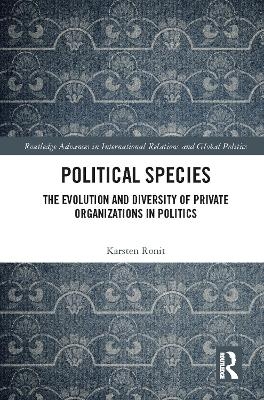
Political Species
Routledge (Verlag)
978-1-032-08017-8 (ISBN)
In Political Species, Karsten Ronit expertly argues that evolutionary biology can provide important sources of inspiration for analyzing the proliferation of private actors/organizations in domestic and global politics. Focusing on the evolution of a diversity of such private actors/organizations in politics, Ronit emphasizes that individuals are affected by and contribute to societal, cultural, and political evolution through a range of formal organizations and that societies, cultures, and politics influence and build upon values and norms transmitted by individuals via these formal organizations. By being mindful of these contextual factors and keeping in mind the important research done in the micro- and macro-perspectives, we can gain a better understanding of the diversity of private actors/organizations and how they evolve and adapt. Evolutionary biology teaches us that over time, different varieties emerge, specialize, and adapt to the ever-changing conditions in complex environments before accumulating into new species. Much change characterizes these processes of political evolution because actors constantly emerge and add to the existing population of private actors that, in one way or another, are engaged in politics.
Karsten Ronit is Associate Professor in the Department of Political Science at the University of Copenhagen, Denmark. He has broad competence in the study of organized interests with special expertise in business and employer associations, civil society organizations, and other intermediary institutions. He takes an interest in the comparative aspects of politics and business and examines how business and civil society operate in different national contexts. He is also engaged in projects examining the behavior of business and civil society organizations at the international level. He has published in a number of international journals, contributed to many books, and more recently published the monographs Global Business Associations (Routledge, 2018) and The Governance of Global Industry Associations: The Role of Micro-Politics (Edward Elgar, 2022).
List of illustrations, Preface, List of abbreviations, 1. Introduction—setting the scene 2. Evolution—analyzing gradual changes 3. Ecology—accounting for wholes 4. Biogeography—studying large spaces 5. Niche—exploring small spaces 6. Competition—researching multiple interactions 7. Adaptation—examining vital adjustments 8. Taxonomy—organizing evolutionary diversity 9. Conclusion—combining conceptual insights , Bibliography, Index
| Erscheinungsdatum | 11.04.2024 |
|---|---|
| Reihe/Serie | Routledge Advances in International Relations and Global Politics |
| Zusatzinfo | 2 Tables, black and white; 6 Line drawings, black and white; 7 Halftones, black and white; 13 Illustrations, black and white |
| Verlagsort | London |
| Sprache | englisch |
| Maße | 152 x 229 mm |
| Gewicht | 453 g |
| Themenwelt | Naturwissenschaften ► Biologie |
| Sozialwissenschaften ► Politik / Verwaltung ► Europäische / Internationale Politik | |
| Sozialwissenschaften ► Politik / Verwaltung ► Politische Theorie | |
| Wirtschaft ► Volkswirtschaftslehre ► Wirtschaftspolitik | |
| ISBN-10 | 1-032-08017-5 / 1032080175 |
| ISBN-13 | 978-1-032-08017-8 / 9781032080178 |
| Zustand | Neuware |
| Haben Sie eine Frage zum Produkt? |
aus dem Bereich


